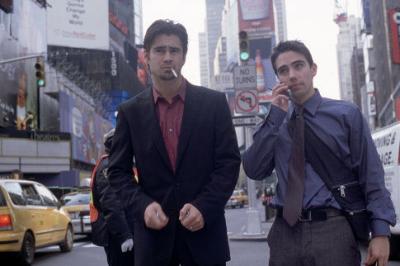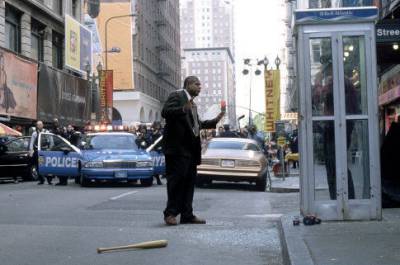Phone Booth
Sniper thriller that makes a refreshing break from the norm.

Colin Farrell has been in every single film this year, it seems. Here he plays Stu Shepard, a public relations slimeball for various C-list celebrities hoping to break through to the big time. In the course of manoeuvring these wannabes onto the covers of the trendy magazines and into the hottest parties, it's natural and essential that he tells a few fibs here and there. This turns out to be a mistake.
He is a creature of habit, walking the same route daily while conducting his business over a cellphone, which an opening voiceover tries to convince us is a symbol of respect rather than a symbol of someone that doesn't have an office. The trip ends in the same place, the last phone booth in that area of New York that hasn't been replaced with the newer, open plan phone stations. In the comparative privacy of this booth, with only a few passing hookers to bother him, he phones one of his clients, Pamela McFadden (Katie Holmes) with the continual intent of getting inside her panties. He's a little guilty about this, what with being married to Kelly (Radha Mitchell) so to alleviate this a little he removes his wedding ring before calling, a mark of a true gentleman.
Not that anything's actually happened between them, and he fails in today's attempt to persuade her to go out for 'drinks'. Why is he doing this from a phone booth? Well, it's later glibly explained that he doesn't want his wife to find out that he has been calling her by examining the phone bill. Given that she's actually a client of his, it would seem that he has a perfectly reasonable need to call her frequently. Still, I'm normally prepared to overlook one gaping plot hole per movie, so lets move things forward.
While inside the booth, a portly chap tries to deliver him a pizza. Despite it being pre-paid he rebuffs this, foul-mouthedly instructing the tubby fellow to vacate the area. This act of rudeness would quickly turn around and bite him on the arse. After finishing his call, the phone rings again. Against everything that's been established of his character so far, Stu answers it and has a chat with the fairly clearly disturbed guy on the other end. Most would have hung up immediately, but who am I to delve into the inscrutable mind of the American PR exec?
The Caller, as he's known, is voiced by the dulcet tones of Kiefer Sutherland, which is an excellent choice. He manages to convey a continual menace, with overtones of insanity when required and clear, balanced delivery to emphasise his threats. He also gets a few funnies in too while Stu sweats in fear. Convincing voice acting is a difficult art, as so much of human communication is in the non-vocal elements, facial expressions and body language. Sutherland, who hopefully will finally be catapulted onto the A-list on the back of this and 24 provides a compelling performance.
Why does Stu sweat in fear? Well, Mr. Caller has a high-powered sniper rifle aimed at his head. It seems that he has been watching Stu for some time and has taken exception to his lifestyle of lies and deceit, which seems a touch harsh given that he hasn't hurt anyone at all so far, but who am I to delve into the inscrutable mind of the American nutjob sniper?
The Caller tells Stu that if he hangs up or leaves the booth he'll shoot him, and destroys a toy robot that was making a gallant break from freedom from his oppressive toy robot vendor to prove his accuracy. Stu and Caller verbally dance around each other, Stu trying to figure out what The Caller wants and The Caller leading him up blind alleys. Business picks up when the local pimp tries to forcibly eject Stu from the booth, as he's hampering the hooker's lines of communication. The Caller shoots the pimp in the back, leading to everyone and their dog thinking that Stu shot him. The hookers in particular have to be breathtakingly stupid or unobservant, given that Stu was in front of the pimp and was supposed to have somehow extended his arms a few feet to reach out, round and cap the pimp in the back. Hmmm. Anyhow, this kerfuffle calls in the cops and the accompanying media frenzy.

Stu is in trouble, with the cops and Captain Ramey (Forest Whitaker) trying to talk him out of the booth and throw away his weapon. This approach is doomed to failure, as Stu doesn't have one. The cops would rather believe the large number of entirely wrong eye witness accounts though, so Stu has to find a more subtle way of informing the police that there's a nutter threatening to give him an extra hole in his head.
Meanwhile The Caller is putting him through an emotional wringer, trying to make Stu face up to what a bad man he is. For good measure, he threatens to add additional cranial ventilation to his wife and prospective bit on the side. Over the course of the hour or so he's in the booth his meticulously constructed confident veneer crumbles as The Caller pushes all the right buttons to have him question and humiliate himself in front of a live television audience. Colin Farrell seems to have replaced Vin Diesel as the recipient of the Jesus push for superstardom, and is a far worthier recipient. His performance over the ordeal, gradually losing hope for himself and trying to save his wife instead is very affecting. It may be a little too early to judge as it's only now we're seeing him outside of the 'weasel' roles so common in his career, but Farrell could well prove to be the outstanding actor of his generation.
Certainly by the time Stu breaks down in tears declaring that his 'two thousand dollar watch is a fake and so am I', you should care enough about his character to feel sympathy for him. It's just a pity that the film (at an already short 80 minutes) takes about a quarter of an hour too long to get there. I have no complaints with how the film unfolds apart from this, but there just isn't enough depth in the plot to warrant the additional run time. The various little sub-plots, such as a minor power struggle between Ramey and the official negotiator seem bolted on and don't fit with the overall structure of the film. They are also dropped about as quickly as they appear leaving me wondering what the point was.
It's one of the few mis-steps that director Schumacher makes in what is probably the best performance in a less than stellar career. Even his use of things like the split screen effects, which has a great tendency to look like a dated film student clich?, come off as well as anyone could reasonably expect.
If the film had dispensed with the extraneous elements and focused more tightly on The Caller and Stu it may be regarded as a classic. As it stands, although Whitaker does everything asked of him well indeed it seems to detract more than it adds. It's still a terribly enjoyable film though, and it's nice to see a brave attempt at engaging an audience through well-written dialogue and (gasp!) good acting rather than having things explode a lot.
Does it earn the official recommendation from theOneliner? Yes, with a caveat. If you rarely visit the multiplexes and prefer to wait for the home releases, this film will lose absolutely nothing on the smaller screen, whereas something along the lines of the forthcoming X-Men 2 and Matrix Reloaded would need to be seen at the cinema to be truly appreciated. That said, if you're after a tense cinematic experience of above Hollywood average intelligence, Phone Booth fills that gap nicely.
Were I in the business of passing quantifiable judgements, I'd award this 4/5 TippyMarks.
Kiefer Sutherland (The Caller)
Forest Whitaker (Capt. Ed Ramey)
Radha Mitchell (Kelly Shepard)
Katie Holmes (Pamela McFadden)